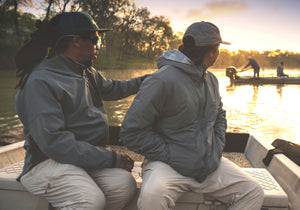Fly fishing is an art, a science, and a passion for many anglers around the globe. At Orvis, we not only provide you with top-tier fly fishing equipment but also strive to enhance your understanding of the intricate dance between angler and fish. The key to a successful fly fishing experience lies in understanding the behaviour of your target fish, and this knowledge can significantly elevate your fishing game.
The Importance of Understanding Fish Behaviour
Understanding fish behaviour is crucial in fly fishing as it directly impacts the effectiveness of your techniques and strategies. By delving into the science behind fish behaviour, anglers can make informed decisions on everything from choosing the right fly to selecting the best fishing spot.
The Role of Fish Senses
Fish rely heavily on their senses to navigate their underwater world. Their keen sense of smell, sight, and lateral line system (which detects vibrations) play pivotal roles in how they find food, avoid predators, and interact with their environment. By understanding these sensory capabilities, anglers can select flies that closely mimic the fish's natural prey, both in appearance and behaviour.
Seasonal and Daily Patterns
Fish behaviour changes with the seasons and even throughout the day. Factors such as water temperature, light levels, and food availability influence where fish can be found and their level of activity. For instance, trout may feed more aggressively during a hatch when insects are abundant, providing the perfect opportunity for fly anglers to cast their lines.
How Fish Behaviour Influences Fly Selection
Choosing the right fly is about more than just matching the hatch; it's about understanding the specific behaviours of your target fish and how they react to potential prey. This section delves into how behaviour influences fly selection and how you can use this knowledge to your advantage.
Predatory Instincts and Fly Presentation
Fish, much like other predators, are attracted to movement, colour, and size that suggest vulnerability or familiarity. A well-presented fly that mimics the erratic movements or distinctive characteristics of the fish's natural prey can trigger an instinctual response. This is where the science of fly fishing truly shines, as it combines entomology (the study of insects) with a deep understanding of fish psychology.
The Impact of Water Conditions on behaviour
Water conditions such as clarity, flow rate, and depth also influence fish behaviour and, consequently, fly selection. In murky waters, for example, flies with strong silhouettes or vibrations may be more effective. Conversely, in clear, slow-moving waters, a more subtle and natural presentation is often required to entice a bite.
Advanced Strategies for Fly Fishing Success
With a solid understanding of fish behaviour, anglers can adopt more advanced strategies that significantly increase their chances of success. This section explores some of these techniques and how they can be applied in different fishing scenarios.
Sight Fishing and Stealth Approaches
Sight fishing is a technique that involves spotting fish before casting. This method requires a stealthy approach to avoid spooking the fish, as many species are highly sensitive to shadows and sudden movements. By observing fish behaviour from a distance, anglers can tailor their approach, choose the appropriate fly, and present it in the most natural way possible.
Behavioural Triggers and Fly Fishing Tactics
Certain behaviours, such as feeding frenzies or territorial aggression, can be triggered under specific conditions. Understanding these triggers allows anglers to employ tactics that can turn an ordinary day on the water into an extraordinary one. For example, during spawning seasons, flies that mimic egg patterns can be particularly effective.
The Orvis Commitment to Education and Sustainability
At Orvis, we are committed to not only providing the highest quality fly fishing equipment but also to educating our community on sustainable fishing practises. Understanding fish behaviour is a step towards respecting the delicate balance of aquatic ecosystems and ensuring that the joy of fly fishing can be shared with future generations.
Conservation Through Knowledge
By promoting a deeper understanding of fish behaviour and its impact on fly fishing, we encourage anglers to engage in more mindful and sustainable fishing practises. This includes catch and release techniques, habitat preservation, and the promotion of ethical angling practises that respect both the fish and their environment.
Orvis Educational Resources
We offer a wealth of resources, including guides, tutorials, and workshops, designed to enhance your knowledge of fish behaviour and the science of fly fishing. Whether you're a beginner or an experienced angler, our expertly curated content is here to help you refine your skills and deepen your connection with the natural world.
Conclusion: The Fusion of Science and Sport
Fly fishing is more than just a pastime; it's a journey into the heart of nature, guided by the science of fish behaviour. At Orvis, we believe that the more you understand about the fish you seek, the more rewarding your fly fishing experience will be. Armed with the right knowledge and equipped with the best gear, you're not just casting a line; you're engaging in a centuries-old tradition that celebrates the intricate balance of life beneath the water's surface.
In the end, the science behind fly fishing enriches the sport, making each cast a learned guess and every catch a testament to the angler's understanding of the underwater world. So, let's embrace the science, respect our aquatic adversaries, and continue the legacy of fly fishing with mindfulness and skill.

